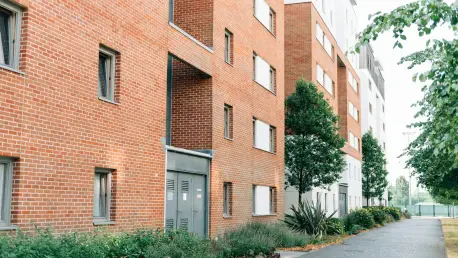In the heart of Exeter, a city grappling with acute housing shortages, a proposed 145-bed co-living block on Summerland Street stands as a symbol of both promise and frustration. Envisioned as a solution for young professionals and key workers, this six-story development by McLaren Property was approved with much optimism, yet over a year later, not a single brick has been laid. This delay, compounded by a deferred £206,000 Community Infrastructure Levy (CIL) payment, raises critical questions about the pace of urban development and the balance between planning approvals and tangible outcomes. As Exeter wrestles with housing demands, this case highlights broader challenges in transforming ambitious blueprints into lived realities, setting the stage for a deeper exploration of co-living trends and regulatory hurdles.
Overview of Co-Living and Urban Development in Exeter
Co-living has emerged as a significant trend in urban areas like Exeter, offering shared living spaces that combine private bedrooms with communal amenities. This model caters to a growing demographic of mobile, cost-conscious individuals who prioritize flexibility over traditional homeownership. In a city where housing supply struggles to keep pace with demand, such developments are often positioned as innovative solutions to accommodate transient populations while maximizing limited urban space.
The importance of co-living is particularly pronounced for young professionals and key workers, who face rising rental costs and limited affordable options. These groups benefit from the lower entry costs and built-in community aspects of co-living, which can alleviate the isolation of urban life. With Exeter’s population steadily increasing, the pressure on housing infrastructure has intensified, making such projects a focal point for city planners aiming to diversify accommodation types.
Major developers like McLaren Property play a pivotal role in this landscape, specializing in student and co-living accommodations across the UK. Their expertise in navigating complex planning processes and delivering high-density projects positions them as key contributors to urban renewal. Meanwhile, Exeter City Council supports these initiatives through strategic land ownership and planning policies, often leasing or selling public land for redevelopment to align with housing goals outlined in the Exeter Local Plan, though not without scrutiny over project timelines and community impacts.
Current Status of the Summerland Street Project
Project Details and Initial Approvals
The Summerland Street co-living block, proposed by McLaren Property, envisions a six-story structure with 145 beds designed to address Exeter’s housing crunch. Located opposite an existing student accommodation on Cheeke Street, the site—previously occupied by local businesses—was restructured by the council for redevelopment. This positioning underscores the area’s transformation into a hub for high-density living, targeting specific demographic needs within the city.
Exeter City Council granted approval for this project in January of the prior year, marking a significant step toward expanding co-living options. The decision followed negotiations to scale back an initial proposal for a taller, 167-bed structure, reflecting efforts to balance density with livability concerns for nearby residents. Despite these adjustments, the approved plan still represents a substantial addition to the local housing stock, promising to reshape the neighborhood’s character.
Bruce Ruddle, a director at McLaren Property, has emphasized the project’s intent to optimize the site’s potential in meeting pressing accommodation demands. The vision focuses on creating a sustainable, high-quality living environment that aligns with the city’s broader housing strategy. However, the gap between approval and action has sparked questions about the feasibility of realizing this ambition within a reasonable timeframe.
Delays and Phased Development Amendment
Despite the council’s approval, construction on the Summerland Street site has yet to begin, casting doubt on the project’s momentum. Over a year after the green light, the lack of visible progress has frustrated local stakeholders who anticipated quicker delivery of much-needed housing. This stagnation mirrors a broader pattern of delayed developments across Exeter, prompting scrutiny of developer commitments.
A recent amendment to the planning consent, approved by the council, introduces a phased development approach, splitting the project into distinct demolition and construction stages. This restructuring allows McLaren Property to secure the planning permission by completing demolition by a specified deadline, currently set for 2027, without immediately commencing construction. Such phasing provides flexibility but extends the timeline for delivering actual housing units, impacting community expectations.
Significantly, this amendment defers the £206,000 CIL payment until the construction phase begins, potentially years after initial site work. While this financial reprieve aids the developer in managing upfront costs, it delays funds earmarked for community infrastructure, raising concerns about the trickle-down effects on local services. The prolonged timeline underscores a disconnect between planning milestones and the tangible benefits anticipated by Exeter residents.
Challenges in Exeter’s Housing Development Landscape
Exeter’s urban development scene is marred by a recurring theme of delayed construction, with the Summerland Street project being just one of many stalled initiatives. High-profile sites like the Harlequins shopping center and a redevelopment on Fore Street have similarly languished post-approval, with minimal work undertaken to prevent planning permissions from lapsing. This pattern frustrates city officials and residents alike, who see approved projects as promises unfulfilled.
A contributing factor to these delays is the speculative nature of securing planning consents, often used to boost land value without an immediate commitment to build. Developers may initiate minor preparatory work to meet legal commencement requirements, thereby preserving permissions while postponing substantial investment. This strategy, while financially prudent for developers, leaves communities waiting for housing solutions and risks creating dormant sites across the city.
Market uncertainties further complicate the landscape, particularly around demand for student and co-living spaces. With declining university enrollment and challenges in the higher education sector, questions arise about the long-term viability of such accommodations in Exeter. These doubts cast a shadow over projects like Summerland Street, where the intended demographic may not materialize as projected, potentially deterring developers from swift action and exacerbating delays.
Regulatory Framework and CIL Payment Deferral
Under the Town and Country Planning Act, the definition of “commencement” as any “material operation” allows developers to secure planning consents with minimal on-site activity. This legal provision means that actions as simple as clearing a site or laying a foundation can indefinitely preserve a project’s approval status. Such flexibility, while beneficial for managing complex developments, often results in prolonged periods before full construction begins.
Community Infrastructure Levy regulations add another layer of complexity, tying payment obligations to procedural notices rather than physical progress. By structuring projects into phases, developers can defer CIL contributions until later stages, as seen with the Summerland Street amendment. Recent High Court case law has reinforced this approach, affirming that phased development can legally postpone financial liabilities, offering developers breathing room in uncertain economic climates.
However, deferred CIL payments impact funding for community infrastructure, such as schools and transportation, which depend on these levies to support growth. Exeter City Council’s approval of the phased approach for Summerland Street reflects a pragmatic acknowledgment of developer needs, yet it also highlights a trade-off. The delay in receiving these funds may hinder timely improvements to local services, prompting debate over how to balance developer flexibility with community priorities.
Future Outlook for Co-Living and Urban Planning in Exeter
Co-living holds considerable potential to address Exeter’s housing needs, offering a scalable model for accommodating diverse populations in a constrained urban environment. Yet, concerns persist about design impacts, such as reduced daylight and privacy for neighboring residents, which could temper enthusiasm for such projects. Striking a balance between density and livability remains a critical challenge for planners and developers aiming to integrate co-living into the city’s fabric.
Emerging trends in urban planning reveal a proliferation of student and co-living developments, with over 1,500 beds either approved or proposed in the Exeter area. This surge indicates a strategic focus on high-density accommodations to meet housing targets. However, the concentration of such projects risks oversaturation, especially if market demand fails to keep pace with supply, potentially leading to underutilized spaces.
The specter of dormant sites looms large, as speculative land value increases tied to planning consents may outstrip actual construction. Economic conditions, fluctuating demand, and developer priorities will shape whether these projects materialize or remain on paper. For Exeter, navigating these dynamics requires robust policies to ensure that approved developments translate into real housing, preventing the city from becoming a patchwork of unbuilt promises.
Conclusion and Key Takeaways
Reflecting on the journey of the Summerland Street co-living block, the complexities of urban development in Exeter come into sharp focus. Delays in construction, coupled with the deferred CIL payment, underscore a persistent tension between planning approvals and actual housing delivery. These challenges, mirrored across multiple city projects, highlight systemic issues in aligning developer strategies with community expectations.
Looking back, the regulatory leniency that allowed phased development offered necessary flexibility but at the cost of delayed infrastructure funding. Market uncertainties further compounded the hesitation to build, leaving Exeter’s housing strategy at a crossroads. The proliferation of similar projects added both opportunity and risk, as the city grappled with balancing growth against potential oversupply.
Moving forward, actionable steps emerge as vital. Exeter City Council could consider tighter timelines for construction post-approval, coupled with incentives for timely completion. Establishing clearer criteria for CIL deferrals might ensure infrastructure funds arrive when needed. Additionally, engaging market analysis to validate demand before approving new projects could prevent dormant sites, ensuring that future developments truly serve the city’s evolving needs.









